All this weekend and into next week, West Hansen and Jeff Wueste will be paddling their two-man canoe from central Texas to the Gulf of Mexico in a 260-mile nonstop test of grit and endurance known as the Texas Water Safari.
Hansen has finished the race 21 times before. He knows what he’s getting into, but this year promises to be particularly difficult, with historically low water and high temperatures. If the forecast holds, it will be 107 degrees on Saturday, and 108 Sunday.
It’s an unusual way to prepare for a single-season transit of Arctic Canada’s fabled Northwest Passage, but it’s what Hansen knows. Ultramarathon canoe racing has been the foundation of his expedition career, which he kicked off with a source-to-sea paddling descent of the Amazon in 2012, the first from the great river’s newly discovered most distant source. Two years later, he and Wueste kayaked Europe’s longest river, the Volga, 2,293 miles from source to sea.
Next up is the Northwest Passage, a gauntlet of water and ice that plays an outsized role in Arctic lore. If successful, the team of Hansen, 60, Wueste, 62, and 31-year-old Rebekah Feaster will be the first to paddle or row the entire Northwest Passage in a single season.
Previous paddling expeditions have typically traveled from west to east, only to encounter impassable sea ice in the last few hundred miles. Hansen’s team will go the opposite direction, trading time—ice-out at the eastern end of the passage comes in late July—for a better chance at clear water. Call it a racer’s gamble.
Adventure Journal: What does racing 260 miles nonstop in oppressive Texas heat have to do with dodging icebergs and polar bears up in the Arctic?
West Hansen: Well, it’s a character-builder.
If we’re paddling in the Arctic for 14 to 16 hours every 24 hour period, and we know at the end of every one of those periods we’re going to stop and sleep, that’s a piece of cake compared to going 48, 50, 60 hours non-stop with no sleep in the Safari. It’s not exactly what I’d call a cakewalk, but having that Safari experience definitely makes it easier to keep in perspective.
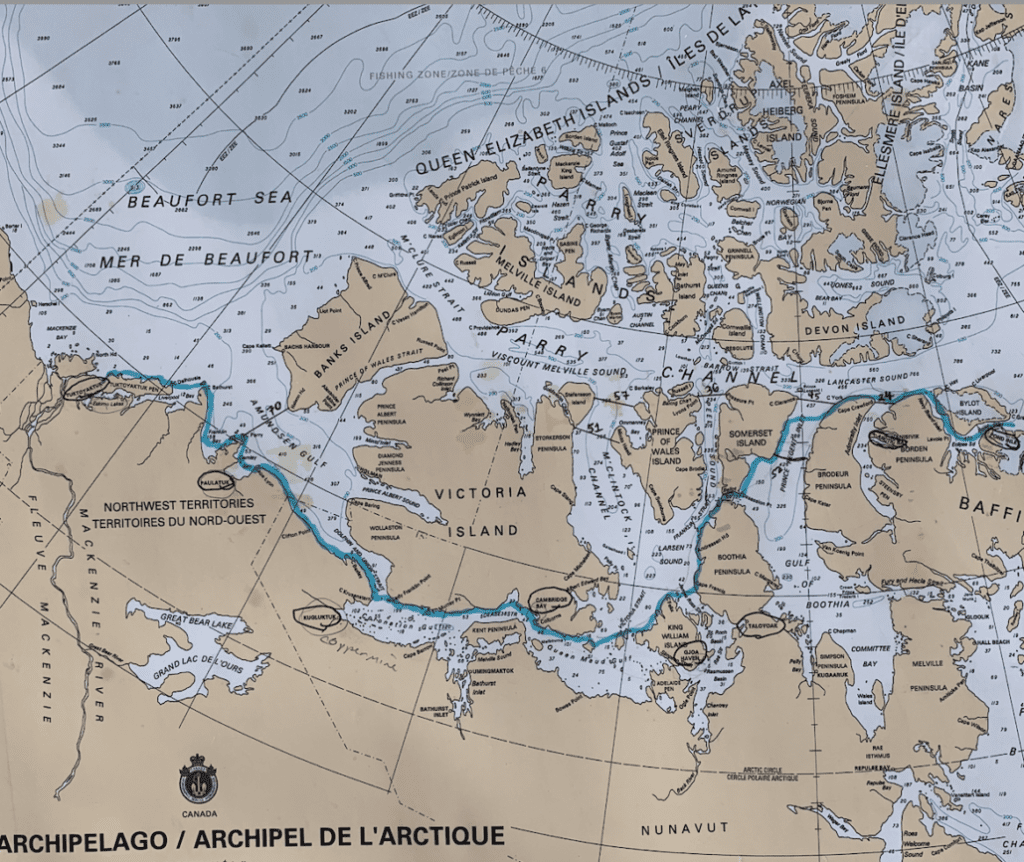 The Arctic Cowboys will attempt the Northwest Passage from east to west, an unorthodox approach that should give them less time but a better chance at ice-free water.
The Arctic Cowboys will attempt the Northwest Passage from east to west, an unorthodox approach that should give them less time but a better chance at ice-free water.
You’re a student of expedition history, so you know about the trouble and travails that different expeditions have had with this stretch of water through the centuries. Which of them did you think about most when planning your own attempt?
I’ve been a huge fan of Roald Amundsen for years. I knew of his South Pole expedition long before I knew about his Northwest Passage expedition, and I was just amazed that this fairly impoverished guy could take on the British Empire, represented by Robert Falcon Scott, who threw all the money they could at it. And here’s Roald Amundsen, who not only beat them to the pole and succeeded, but probably gained weight along the way.
Prior to his Antarctic expedition, Amundsen had done the Northwest Passage. It had been crossed several times over ice and land, first by McClure after he was shipwrecked in search of the Franklin expedition. Amundsen was the first to navigate the passage in a ship, and he did it primarily by going simple and small and learning from the locals. I have a lot of respect for that type of mentality, and I try to emulate that with our expeditions—especially after throwing the kitchen sink at it during my first expedition.
The Amazon source-to-sea?
That’s right, and we threw too much at that because I didn’t know what I was doing. I learned that you can be more successful with much less gear and far fewer people.
What about the more recent paddling attempts at the Northwest Passage? Have you drawn lessons or inspiration from those?
Yes, and I’ve actually got a timeline and details of those on my website, which our webmaster Tom McGuire put together. Even as far back as Victoria Jason and Don Starkell, I read their books and learned a lot from everybody that’s tried it in a kayak or a rowboat. That’s why we’re going to start on the east side, near Baffin Bay and kayak west towards the Beaufort Sea. Most of the other expeditions went the other way and ended up with winter coming down. They couldn’t get past the ice blockages.
We’re going to make sure the ice is clear in the northern or colder part before we go. So we’ll have less time, less of a window to complete the entire expedition but towards the end we’ll have clearer seas.
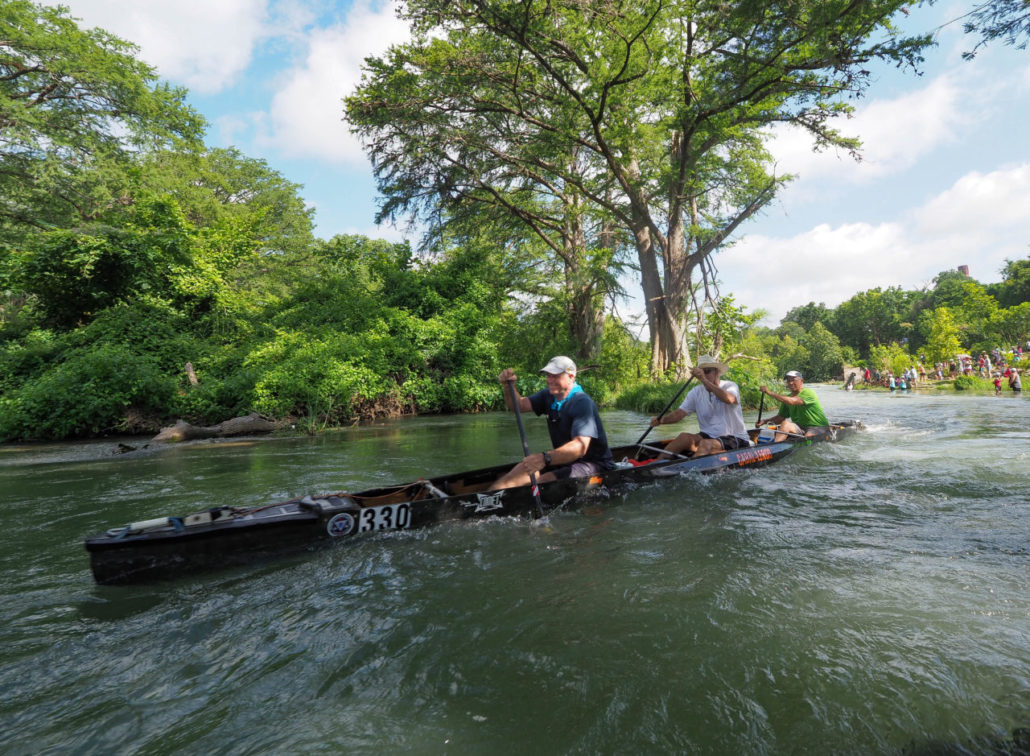
Arctic Cowboys expedition members West Hansen, Jimmy Harvey and Jeff Wueste in the 2021 Texas Water Safari. Harvey later left the team over a disagreement about the route. Pam LeBlanc photo.
That seems to fit the racer mentality. You’ll start later but if you can paddle faster, you’ve got a better chance of finishing before the ice closes in.
I wouldn’t necessarily say we paddle faster. I think we just paddle more efficiently. We probably have a little bit better cruising speed, but the main thing is we just don’t stop. We eat while we’re paddling. We talk, we tell jokes, we sing, we just cruise and have a good time. But we only stop for a total of an hour a day, and we’ll paddle for 14 to 16 hours. We pee, we poop, we drink, we eat, we sing, and we just keep cruising along.
How do you poop in a kayak?
I never have. I’ve always jumped out and left it to the sea life.
Glad I clarified that. I don’t think I’ve ever asked anyone that question before, but here’s the one everybody asks: What makes you think you can succeed where so many others have failed?
Like Amundsen, I learned from the others. They were trailblazers, even though they didn’t complete the entire thing. Jon Waterman is a good friend. He’s been very helpful, and his book Arctic Crossing is full of really great advice. I’m not trying to reinvent the wheel here. I’m just trying to avoid the pitfalls others fell into, and accentuate the things that I already know.
Do you have a sense that now is the time—that because of the changing climate a window of possibility is just cracking open, and that paddling the passage may soon become more commonplace?
Yes, and I think we’re right on the cusp of that now because we’re not sure that all the ice is going to clear. We’re watching it daily, and I think it’s going to break up enough to that we could navigate it with our small kayaks. I do think it will become more commonplace, but what’s going to be even more common is commercial shipping using the Northwest Passage, and we’d like to get up there to see this pristine area before it becomes a superhighway of tankers and cargo ships.
One of your team members, Jimmy Harvey, bowed out over your choice of route. What are the advantages and disadvantages of your east-to-west strategy?
The disadvantage right off the bat is we’re going to have less time to do it. There’s only a short window of time in the Arctic where the sea ice is broken up enough and the wind conditions are good. And we’re cutting down that time by waiting for the ice to melt up in Lancaster Strait.
The advantage is we’re going to be assured that the ice is broken up in the coldest section of the passage. So we’re going to get the more precarious section done first. And then towards the last half of the passage, while winter may be starting to set in, it won’t freeze until well into October.
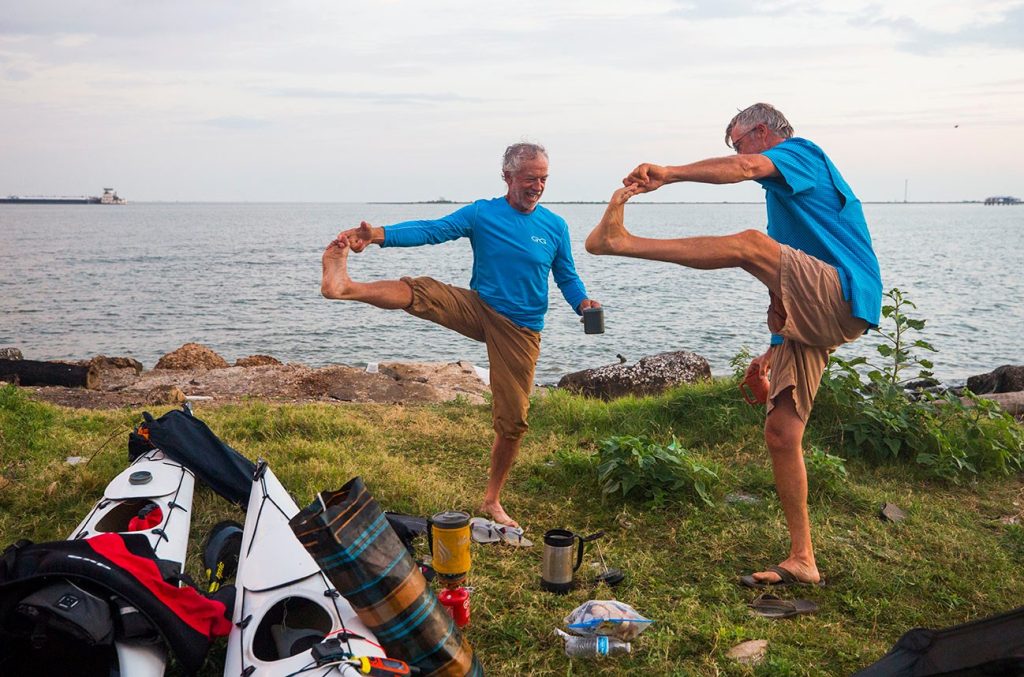
Wueste, seen here during a 2020 kayak traverse of the Texas Gulf Coast, brings steadiness and good humor to the team. Pam LeBlanc photo.
Is it a question of the ocean freezing over, or of drift ice moving into the passage?
It used to be that the ocean would freeze, but that’s pretty rare in the Northwest Passage now. Now you have ice that forms farther north and drifts down into the passage. Towards the end of September or beginning of October, the storms in the Arctic pick up and start pushing that drift ice into the passage. So we’re looking at two things: The air becoming colder, and more drift ice coming into the passage. I don’t think it’s going to be that bad even in October, but I also don’t think they were going to be there that late.
So there’s an element of luck. If there’s a storm in the wrong part of the ocean and it pushes that ice down earlier than usual you could get caught out. But by the same token, if fortune smiles you could have clear water all the way.
Yes, exactly. And that’s been the trend. That’s why I’m feeling fairly confident about the lower portion of the passage, because I’ve been following it the past few years and it’s getting later and later before the freeze comes in. In Tuktoyaktuk last year, temperatures were in the seventies and eighties, and in October it was just getting down to freezing. So I think we’re going to be okay.
Finishing in time is one thing, but there’s another crux in Bellot Strait, isn’t there?
I think that’s going to be our most challenging water conditions. I can’t find any record of it ever being kayaked. It’s 17 miles long and the tides get up to eight knots, and every four hours it reverses. It’s very narrow and the water just flies through there, which isn’t a problem unless you’ve got floating ice that you’re flying toward at nine knots per hour, or if the ice is coming towards you.
That’s something we’re going to have to watch very carefully.
What do Jeff Wueste and Rebekah Feaster bring to the team?
Jeff is a feet on the ground guy. He’s not one to do interviews or set up sponsors or do any of the background stuff, but he excels on the ground, man. Once he’s on an expedition, he is extremely reliable. He’s good with the milieu and he’s got a good sense of humor. He’s a good team player and he’s good at kind of balancing out my intensity with a little more easygoing attitude, and we really need that.
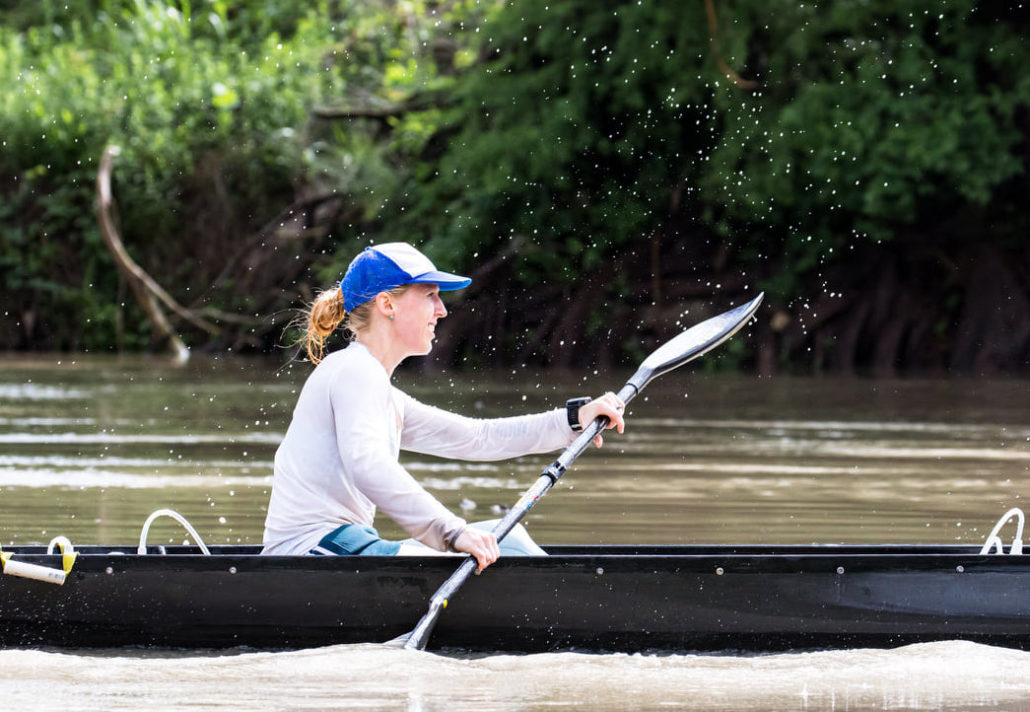
Rebakah Feaster training in Texas. The youngest Arctic Cowboys team member brings serious endurance paddling chops. Sandy Yonley photo.
I’ve known Rebekah since she was doing kid canoe races. And we’ve always wanted to include women on our expeditions ever since we started doing the Amazon, and it just never worked out. There’s only x amount of guys that can do this kind of thing, and a smaller number of women that can do it. And then there’s an even smaller number that could fit our team personality. Rebekah checks all those boxes.
The other thing that’s part of our formula, and this may sound kind of strange—I need people on the expedition to have some life experience, and by that I mean that have experienced some tragedy and come through it. That sounds odd, but it really helps people keep things in focus when things are going bad out there. Rebekah has had some life experience, and she just seemed to have the right attitude. Great sense of humor, appropriately dark when it needs to be.
The personality mix of an expedition seems to be an important element of your planning.
It’s more important than ability. I put the personality over paddling skills, any day. I talked to Eric Larsen about coming on our expedition, and he doesn’t paddle. He’s had some serious life experience lately, but he has the exact personality that would do well on our team, even though I would have had to teach him how to paddle. So paddling ability is way down the list
The other thing is, we’re with each other 24-7, and I learned on the Amazon that, man, if you can’t stand being around somebody—if you’re waking up in the morning and thinking, ‘Oh, you’re still here,’—it just makes it a miserable experience.
You’re 60, and Jeff is 62. Rebekah is obviously younger, but how does your age influence your approach?
It helps us, because we’re older and we’ve done a lot of this before. Rebekah’s kind of new but again, she’s an experienced racer. It’s kind of funny because we do a lot of trivia, and for example with the Tigers [the team of whitewater paddlers who joined Hansen on the Amazon headwaters – eds.] down on the Amazon, we made a lot of jokes about Pulp Fiction. But those guys had never seen the movie. It came out the year they were born.
So you’re starting after ice-out around the end of July, and it’s about 2,200 miles. How long do you expect to be out?
I think 60 days on the water. That’s 37 miles per day.
So that would put you in Tuktoyuktuk at the end of September?
We’re prepared to go a couple of weeks into October if need be.
What kind of ripcord do you have if you need to pull it?
We’re unsupported. We are going to mail packages ahead of time to a couple of the villages, like Cambridge Bay and Gjoa Haven along the way.
And then Robert Ewans is a local Austin guy who’s a canoe racer also, but he’s part of this culture where they take open Jon boats across great distances. He’s launching from Tuck and he’s going to go all the way through the Northwest Passage to Pond Inlet, then turn around and come back. He’s going to meet us at Fort Ross, which is at the mouth of Bellot Strait in Prince Regent Sound, in order to drop off some food if he sees us and get some drone shots of us going through Bellot Strait. He’s a licensed international drone pilot. He doesn’t have just your little pocket drone; he’s got all of them.
We plan to meet him up there, but since tragedy is just a moment away in the Northwest Passage, we’re not counting on it. If he’s there, it’ll be wonderful to see him and we’ll get extra food from him, but we’re going to have enough food and supplies and the mentality that we’re not going to have any help or resupply until we get to Gjoa Haven.
Read more :
- Neal Moore Finishes Two-Year Solo Canoe Journey With a Pack Of New Friends
- The First Canoe Self-Help Of Grand Canyon Simply Occurred, And It Was A Ball
- Canoeing Throughout the Entirety of Canada With a 5-12 months-Previous
- USA Road Trip – 8 best things to take a walk on North America’s wild west side
- Top 5 best hiking trails in Wisconsin 2022
- Ruins, reefs, romantic beaches and more of the best places to visit in Central America in 2022
- The Cooler People Know About Whitewater, Too
- The best travel tips for solo female van life in 2022
- Cheap thrills in the Big Apple: New York City’s best free experiences in 2022
- The UK & Europe road trip bucket list in 2022

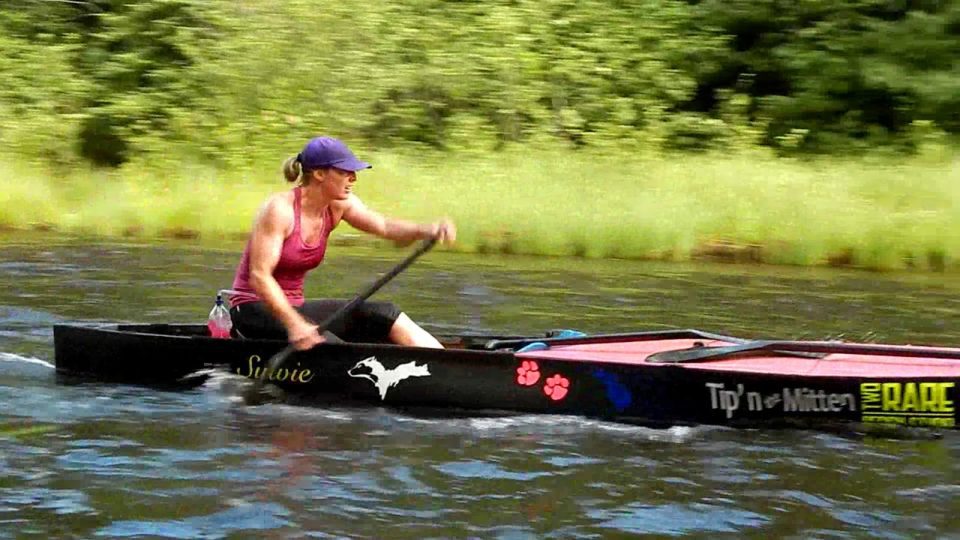
1 comment
I have not checked in here for some time since I thought it was getting boring, but the last few posts are great quality so I guess I will add you back to my daily bloglist. You deserve it my friend 🙂